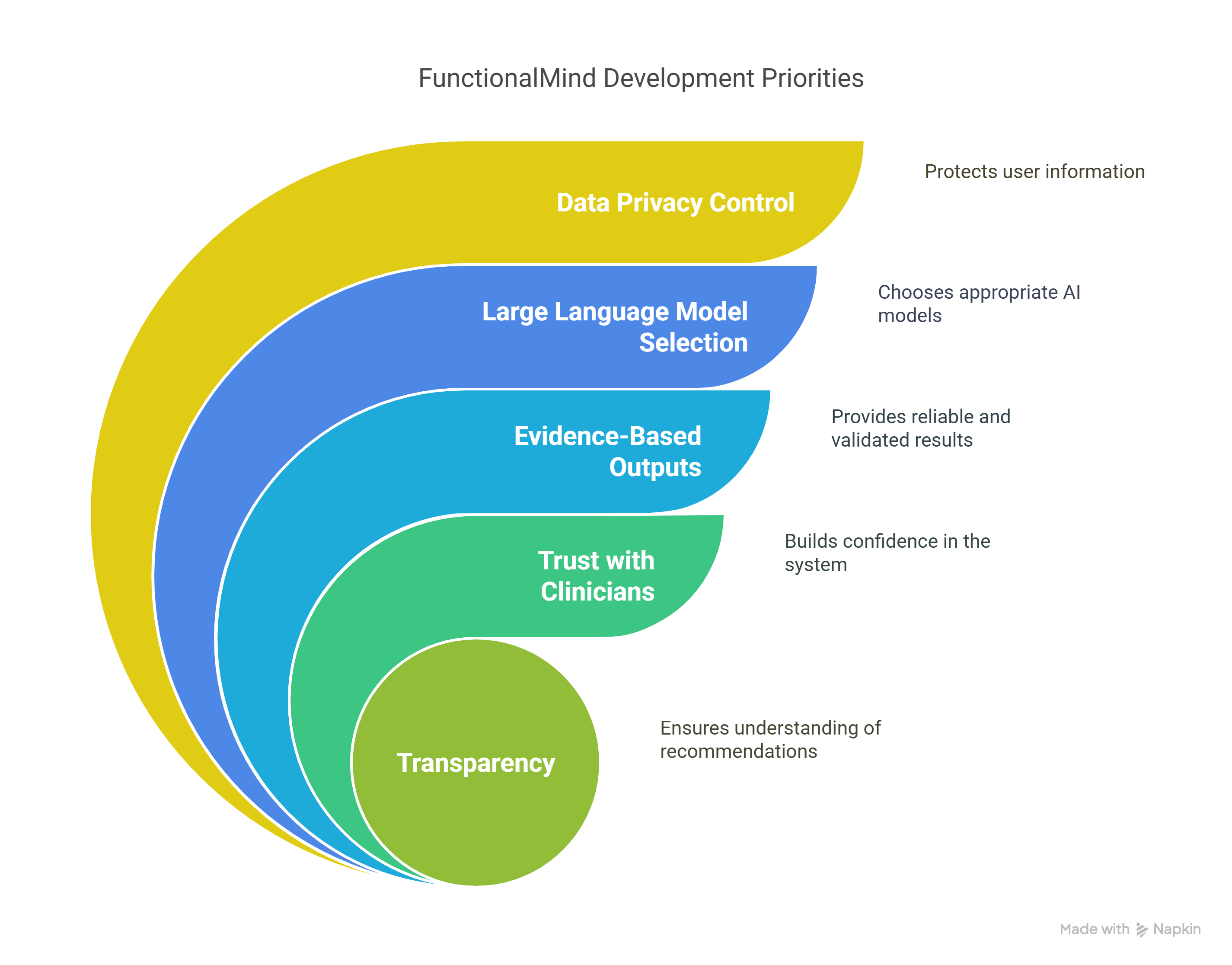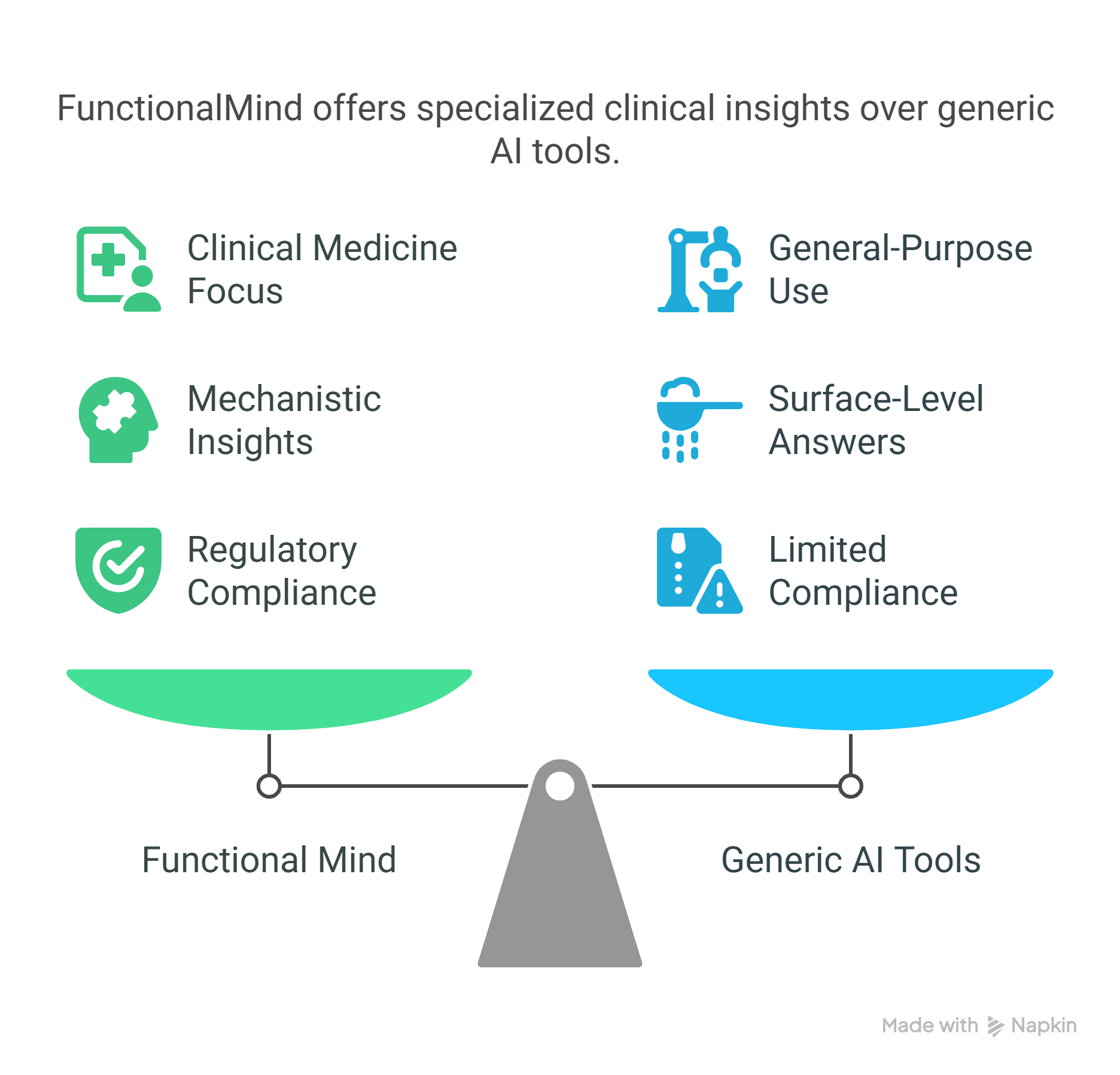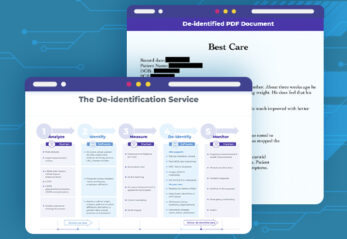How is AI redefining functional medicine?
Functional medicine is undergoing a transformation, powered by artificial intelligence. At the core of this evolution is a shift away from managing symptoms toward identifying and addressing the root causes of disease. This approach is inherently data-driven and deeply personalized, an ideal match for AI technologies designed to integrate complex health data and support clinical decision-making.
FunctionalMind™, an AI platform developed in partnership with John Snow Labs, exemplifies this transformation. It leverages advanced natural language processing and evidence-based analytics to assist clinicians in delivering individualized care more efficiently and accurately.
Why is functional medicine well-suited for AI integration?
The foundational principles of functional, integrative, and lifestyle medicine are inherently aligned with AI capabilities. Practitioners in these fields often adopt innovative diagnostics and rely on emerging biomarkers and scientific literature to guide treatment. This creates a fertile environment for AI to add value by synthesizing large volumes of clinical data, providing tailored recommendations, and streamlining workflows without sacrificing the personalized nature of care.
By applying AI, functional medicine practitioners can more easily assess a patient’s unique biological makeup, lifestyle factors, and environment, then formulate customized plans that do more than treat symptoms. These interventions aim to restore optimal function, prevent chronic disease, and extend health span.
What clinical challenges is AI helping to address?
Practitioners in this space face mounting complexity. They contend with information overload, time constraints, increasingly difficult cases, and a historical lack of AI tools built for their needs. Many also have limited experience with AI, making it difficult to know where to begin or how to evaluate AI-generated insights.
To solve these challenges, the development team behind FunctionalMind™ focused on four priorities: ensuring control over data privacy, selecting the right large language models, designing evidence-based outputs, and building trust with clinicians. Importantly, the system supports full transparency, allowing users to understand the rationale behind each recommendation, critical for maintaining clinical confidence and patient safety.
How does AI enhance personalization in care?
Personalized medicine requires more than data; it requires interpretation. With AI, clinicians can rapidly generate comprehensive care plans that reflect a patient’s unique biology, lifestyle, and preferences. This includes nutritional strategies, supplement regimens, and treatment protocols that are not only scientifically valid but also practical for the patient to follow.
For example, creating a nutrition plan tailored to a construction worker’s schedule and physical demands used to take hours of unpaid labor. With FunctionalMind™, this process is condensed to minutes. The AI adjusts macro and micronutrient recommendations in real-time, ensures the plan aligns with the patient’s daily routine, and provides explanations that improve understanding and compliance.
What makes FunctionalMind™ different from generic AI tools?
Unlike general-purpose chatbots or LLMs, FunctionalMind™ was built from the ground up to serve clinical medicine, specifically the complex needs of functional, integrative, and lifestyle care. It provides mechanistic insights, includes cited references for clinical validation, and supports HIPAA, GDPR, and global regulatory standards. Moreover, it is continually updated with new scientific findings and designed to integrate seamlessly into clinical workflows.
When compared to widely used tools like ChatGPT, FunctionalMind™ delivers more than surface-level answers. It offers referenced, mechanism-focused explanations that help clinicians connect the dots across biological systems, which is essential for managing multifactorial conditions like chronic inflammation or metabolic dysfunction.
Can AI support human-centered care?
Despite its power, AI is not meant to replace the human elements of healthcare. Instead, it enhances them. By reducing the time clinicians spend on administrative or analytical tasks, AI frees them to focus more on listening, explaining, and empathizing. It also facilitates real-time communication with patients, offering simplified summaries of complex conditions and treatment plans.
A 2019 AAMC study found that patients value holistic care, effective communication, and current medical knowledge. AI can support all three by making it easier for clinicians to stay up-to-date and engage meaningfully during consultations. In this way, AI becomes a partner in care, scientifically rigorous, yet deeply human.
What lies ahead for AI in functional medicine?
Looking to the future, FunctionalMind™ is poised to expand its capabilities. The roadmap includes integrating multimodal patient data, advancing agentic models to support more dynamic care planning, and continuously training clinicians to harness AI effectively.
While the technology continues to evolve, the focus remains on reliability, transparency, and clinician empowerment. AI should elevate the clinician’s capabilities, not diminish them. And perhaps most importantly, it should keep the patient at the center of every decision.
FAQs
What distinguishes functional medicine from traditional models?
Functional medicine focuses on identifying the root causes of disease, rather than simply managing symptoms. It considers a person’s genetics, environment, and lifestyle to develop a personalized care plan that restores function and prevents illness.
How does FunctionalMind™ help reduce clinician workload?
By processing clinical notes, research, and lifestyle data, FunctionalMind™ quickly generates individualized recommendations. This helps clinicians make faster, evidence-based decisions under time constraints.
Is FunctionalMind™ compliant with healthcare regulations?
Yes. The platform is designed to meet HIPAA, GDPR, and global data protection standards, making it safe for clinical use across regions.
Why is explainability important in clinical AI tools?
Clinicians must be able to understand and validate AI recommendations. FunctionalMind™, an AI platform developed in partnership with John Snow Labs, provides referenced reasoning, allowing users to trust and scrutinize its outputs as part of responsible care.
Will AI replace doctors in functional medicine?
No. AI is a tool that empowers clinicians, not a substitute for them. Doctors who use AI will be better equipped to deliver precise, patient-centered care, without losing the human touch.































